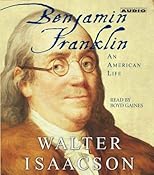
Benjamin Franklin An American Life by Walter Isaacson
 Author Walter Isaacson’s treatment of Franklin is deft, insightful, and fair. He neither engages in hagiography or revisionism. After reading this book, one gets a very good sense of Franklin’s character and personality. It contains enough historical detail and explanation of the events occurring in the subject’s lifetime to give meaning to his words and deeds. The incidental coverage of John Adams is especially interesting when taken in context with McCullough’s biography.
Author Walter Isaacson’s treatment of Franklin is deft, insightful, and fair. He neither engages in hagiography or revisionism. After reading this book, one gets a very good sense of Franklin’s character and personality. It contains enough historical detail and explanation of the events occurring in the subject’s lifetime to give meaning to his words and deeds. The incidental coverage of John Adams is especially interesting when taken in context with McCullough’s biography.
Isaacson doesn’t have much to say about any of the other founders, but does lend color to the events surrounding the Declaration of Independence and the Constitutional convention. It was very interesting to read of the impact that Franklin had on so many momentous events. The author’s coverage of Franklin’s time in France and his description of the masterful negotiation that he undertook in getting the peace treaty signed is very illuminating. Franklin, while appearing to be a Francophile to John Adams, among others, actually negotiated quite well with the British, extricating his new nation from any continuing obligation or involvement with France. He was able to separate the British-American accord from that between France and Britain. He maximized his negotiations to great advantage and played both sides off against one another. Isaacson goes so far as to agree (with other’s assessments) that this was the most successful American foreign policy negotiation ever.
He precisely uses some of Franklin’s own writings throughout the book. Having recently finished reading a collection of some of his lesser known writings, it was great to find some of these works referenced with context. For example, Franklin’s Petition of the Letter Z made a good deal more sense and was in fact quite funny, when you realize that it was actually a thinly disguised lampooning of an American diplomat named Ralph Izard, who tried to horn in on the negotiations with France and raised Franklin’s ire. In this short satire, Franklin makes a pun on his name, “The Petition of the Letter Z, commonly called Ezzard, Zed, or Izard” and points out that the letter Z was totally excluded from the word WISE.
There were several such instances in the book where the author gave color and context to some of Franklin’s more satirical writings giving them a lot more meaning for uninitiated reader.
In addition to referencing Franklin’s writings, the author also goes into considerable detail about his personal life, his religious views, and his foibles. This is not a book that engages in hero worship, but it does give credit where credit is due. Franklin struggled with when to break with England, and worked hard as a loyal British subject until as late as 1775, sometimes to the detriment of his own reputation. But, when he arrived at the turning point, he did so wholeheartedly without any reserve. He was influential in the formulation of the Declaration of Independence, the Peace Treaty with Britain, and the Constitution. He was signatory to all of them. He served as president of Pennsylvania, and formulated the Albany Plan on which parts of the Constitution were later based.
Franklin is fairly treated and accorded the respect he deserves. He is definitely one of a handful of people, without which, this country might not exist today. This is an excellent and highly informative biography.
Is there anyone of similar stature today?
 The posts are coming!
The posts are coming!

0 comments
Kick things off by filling out the form below.
Leave a Comment